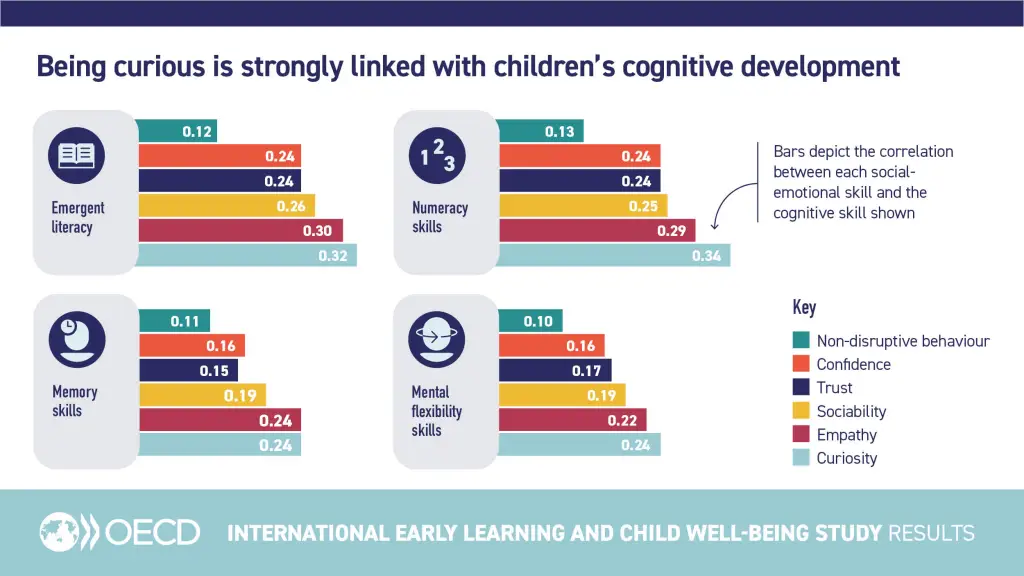
Moonpreneur
Did you know children tend to use a lot of interrogative words in their conversations, such as “what,” “when,” “who,” and “how”? Well, that’s because they’re born with a natural curiosity and a strong desire to learn about the world around them. It’s amazing how much kids can absorb and process at a young age some Tips to Develop Children’s Curiosity!
For children, possessing a curious mind can be a positive indication of their intelligence. It’s critical to answer their queries, and if you cannot, research and read relevant books with them to satiate their interest.
Recommended Reading: Who invented exams? Here is the answer!
Developing a child’s curiosity is one of the most important ways parents can help make their children lifelong learners. Curiosity is strongly linked to a child’s cognitive development, as evidenced by the OECD’s International Early Learning and Child Well-being study, which found that emergent literacy, numeracy skills, memory skills, and mental ability skills are all strongly linked to curiosity.
For parents who want to develop their children’s curiosity, some tips can help them do so without pressuring them.

Tips for developing Children’s Curiosity:
1. Accompany your child on their curiosity-led adventures
When a child is attempting to take the lead, parents need to accompany and follow them. This motivates and engages them in their activities, allowing parents to cultivate their child’s natural interests.
Children primarily learn through activities that capture their attention, so if a child has a fondness for music, parents should make a point to play it often and incorporate learning into those moments. Whatever the child’s interests, parents should provide support and encouragement to pursue them accordingly.
2. Answer their queries clearly and simply
Curiosity drives children to ask a slew of queries. Do not rebuff them. It’s important not to dismiss their inquiries but instead provide answers in a way that is easily comprehensible to them. If your answers are unclear, kids may gradually lose interest in asking questions, hindering their overall development.
3. Try to create a pleasant and interesting atmosphere
Children spend approximately one-fifth of their waking hours intently observing their surroundings, taking a keen interest in everything from wall decor to regular family activities.
4. Expose them to the world around them
Children possess an innate desire to learn whenever they come across something new. Traveling to unfamiliar places, meeting people from diverse cultures, and exploring the world around them can foster their curiosity and drive to learn. Such experiences can broaden their general knowledge and understanding of the world.
5. Make room for family time
Plan educational outings with your child, as children cherish spending time with their parents. Set aside time from your busy schedule and be fully present with your child. Whether it’s a visit to a planetarium, museum, park, or zoo, choose activities that fit your schedule and preferences.
6. Allow them to do open-ended activities
Although children are frequently given toys, parents must provide them with other materials, such as water, sand, blocks, or art supplies. Let them explore and experiment with these materials, following their curiosity and interests. This activity can help foster their creativity and self-directed learning.
7. Don’t discourage
Saying “no” can hinder a child’s growth. Children’s natural curiosity leads them to pursue what they love the most. Instead of discouraging or stopping them, it’s important to allow them to explore their hobbies and interests. Encourage them to learn more about what interests them and answer their questions patiently.
8. Encourage observation in children
If you want to foster your child’s observation skills, simply point out objects and ask a few questions, such as ‘What is this?’ or ‘What color is this?’. Additionally, you can point to an object and ask their children to identify other objects with the same color. These simple activities can make children more attentive and observant.
9. Allow children to play independently
Parents often rush to help their children when they are struggling to find solutions to problems. However, this is not the best approach. Instead, parents should supervise and encourage their children to try to solve the problem independently. Providing such opportunities for independent play can foster curiosity and help children become self-reliant.
Recommended Reading :
- 10 Ways to Enhance Logical Thinking in Kids
- Tips to Prevent Gaming Addiction In Young Children in 2026
- 10 Smart Tips For Career Planning for Kids
10. Let them make mistakes
Children inevitably make mistakes as they learn new things. It’s important not to criticize them but to praise them for trying and encourage them to learn from their mistakes. Yelling at children when they make mistakes can discourage curiosity and hinder their learning.
By implementing the tips above, you can foster curiosity in your children, encouraging them to explore their interests and learn more about the world around them.
Just remember do not pressurize children to ask questions, as research shows that a child’s internal desire to learn, rather than the external pressure, motivates and encourages them to experience new things, leading to great success in education.
Moonpreneur is dedicated to transforming conventional education, preparing the next generation with comprehensive learning experiences. Our Innovator Program equips students with vital skills in AI/ML, Robotics, Coding, Game Development, and App Development, fostering entrepreneurship through hands-on learning. This initiative aims to cultivate the workforce of tomorrow by integrating innovative technologies and practical skills in school curriculums.
Register for a 60-minute free workshop today!

























What are some fun activities to nurture curiosity at home?
Encourage pretend play, science experiments (baking soda volcanoes!), arts & crafts with open-ended materials, reading diverse books, and asking questions about everyday things. Even simple questions like “Why is the sky blue?” can ignite their wonder.